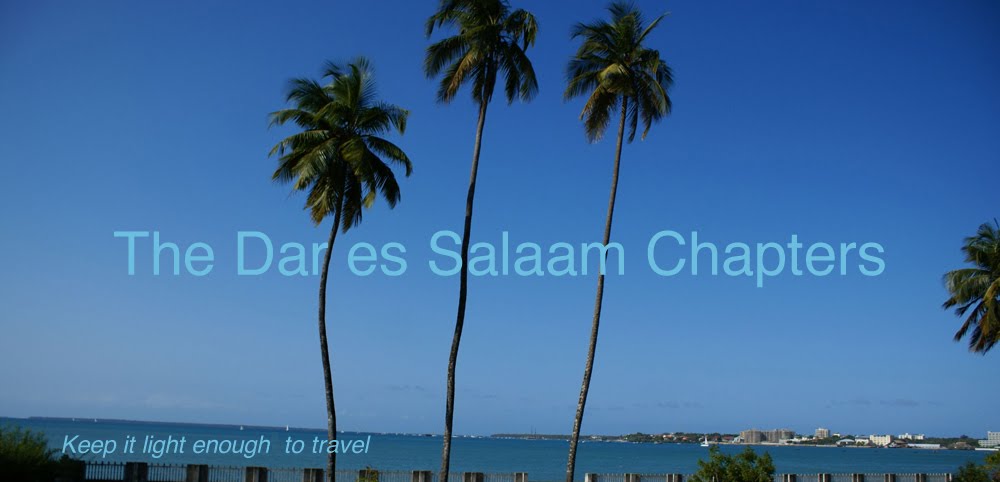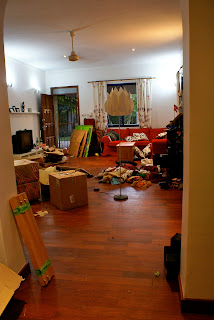I was having lunch in our cafeteria at work on Friday when a feature article in the daily Tanzanian newspaper,
The Guardian, caught my eye. "TB in Tanzania is Self-inflicted" was the title. There are so many things about this article that irk me that I just had to share it. A lot of the English newspapers here read something like this (incoherent sentence structure and random references to God).
It's a long read and even after transcribing the whole thing I still felt like I was sort of lost. Hope you enjoyed it as much as I did. Please note that I have checked to make sure I haven't inserted any extra confusion via typos... so this is how it appeared in newsprint.
Headline: “TB in Tanzania is self-inflicted”
The proclamation by the Article 14 of the Constitution of the United Republic of Tanzanian, 1977, as amended, that every person has the right to live and to the protection of his/her life by the society in accordance with law has, throughout the 49 years of the Independence of Tanzania Mainland, fallen upon almost deaf wars of the public authorities duty – bought to protect the society against the devastating consequences of tuberculosis (TB), a disease mainly of the lungs, i.e. the two organs in the chest that one uses for breathing.
Late last year, Tanzania’s National Institute for Medical Research (MINR), reported Dar es Salaam as leading in TB infection.
TB is such a dangerous disease that is was included in the Schedule to the Infectious Diseases Act, cap. 96 of the Revised Laws (R.E.) of Tanzania 2002, among the list of diseases required to be notified to the prescribed Medical Authority. The Act was originally passed as an Ordinance, some 41 years before Independence ton December 9, 1961, and was repealed with effect from 1st July, 2009, by the Public Health Act, NO 1 of 2009.
If TB germs enter the lung(s), they lodge there and multiply so that contact with the infected person may be very generous
, e.g. a parent killing a baby. Otherwise TB is spread by the TB patient coughing, sneezing or through contact with contaminated things such as spitting on the floor or elsewhere, wiping the mouth with the hand or handkerchief, spoons, forks, plates etc.. The disease, therefore, endangers those who are in frequent contact with the patient, such as members on of the household: spouses, children etc.
The patient tires easily, has pain in the chest, loses either, has poor appetite, may spit blood, etc.. The best thing then is to consult a physician, and remain under his/her care, who may resort to an X-ray or sputum test.
One can, therefore imaging that if almighty God wanted to impose death through TC for the Unholy Spirit of Acquisitiveness Roho Mtakavitu vitu) of the Dar es Salaam resident, people would scramble out of Dar es Salaam. Just imagine the congestion on the commuter buses, the people feeding at the street for vendors’, the drinkers from the small traditional cups of coffee sold on the streets, the constant shaking of hands, they are spitting all over the place including the pavements!
In commuter buses, the conductor delights in the collection of money and least cares about the excessive number of passengers that may interfere with the centre of gravity of the bus so that the driver of the bus drives it as long as if he is looking for an accident to happen. The street food vendors, who are mostly ? wash the late, knives, forks and cups in the same
vessel of water – say a basin, customer after customer, with the probability of transmitting TB germs.
The itinerant vendor of coffee carries his metal vessel over burning charcoal in one hand whilst the other hand carries a vessel containing water and several cups.
Once he meets a customer, he takes a cup out of the water, fills the cup with coffee and gives the cup to the customer. The customer finishes and wants another cup, the vendor will immerse the used cup in the water vessel for purported cleaning and pour out more coffee into the cup. Used empty cups keep being immersed in the same water so that, with so many immersions from early morning till evening, the water might look like it is coffee. In the water, the TB germs have a wonderful time for being transmitted from one customer to the other, and so on and so forth.
The obligation imposed by the Act to notify TB emphasized the dangerousness of TB. The duty of notification fell upon: the head of the family of the patient, the nearest relative of the patient, every person in charge of the patient and every occupier of the same building as the patient. The obligations was imposed on these persons in that descending consecutive order and devolved on the next person in case of default of the person preceding.
In regard to a patient in a camp, the duty fell, in the absence of the persons mentioned above, on the occupier of the camp to notify the person in charge of the camp so that the latter person might give notification to the Medical or Administrative Officer.
Further, the Act prescribed measures to be taken for the isolation of TB patients. The Act imposed restriction on movement of the patient and provided for the patient’s removal to hospital. In particular, the Act provided that any person who had been in contact with any person suffering or reasonably suspected of suffering from TB might be removed and confined within a segregation camp for the period directed by a Medical Officer of Health and be made to submit to the disinfection of his (the patient’s) person and belongings as directed by a Medical Officer of Health.
The Act also provided that no person shall enter a hospital or other place used for the reception of persons suffering from TB or a segregation camp without the sanction of a Medical Officer of Health.
The other sections of the Act dealt with matters including: inspection of premises, requirement for disinfection prohibition of removal of infected articles without them being disinfected, burial of persons dying of TB, etc.
The entire Act was enacted to prevent the spread of infectious diseases, to define the nature of illnesses which required notification to medical authorities to take power to declare infected areas, and to regulate the entre of persons into and their exit from such areas. The infectious diseases to which the Act applied included AIDS, cholera, leprosy, primary secondary syphilis, rabies and yellow fever.
As stated above, the Public Health Act is in force for nearly one year and six months now but it does not contain a schedule listing tuberculosis as one of the national notifiable infectious diseases. This Act was passed to provide for the promotion, preservation and maintenance of public health with a view to ensuring the provisions of comprehensive, functional and sustainable public health services to the general public and to provide for other related matters. It applies only to Tanzania Mainland.
However, section 17of the latter Act provide that tuberculosis may be declared as a national notifiable disease to be reported weekly where the Minister responsible for Health is of the opinion that there is occurrence of tuberculosis. The declaration has to be by notice in the Government Gazette and in any local widely circulating newspaper. Upon that declaration, sections of the Act may be invoked regarding TB as to: notification of TB, isolation of infected persons, powers of entre, etc. I am not aware that section 17 above or any other section of the Act has been invoked in respect to tuberculosis.
The TB situation is complicated by notorious inadequacy of medical facilities in the country. Just imagine! On December 29 2010, it was reported that in Arusha Regions, 13 health centres has been closed on the grounds of some being unregistered, incompetence of medical staff and of lack of laboratory facilities in some of them and that, in the same Regions, 17 such centres has been warned of failure of meeting health standards.
And, on December 31 3010, the report was that the Nzega District Hospital was in dire need of 318 employees, and it was alleged that, at the National Referral Muhimbu Hospital, Dar es Salaam,
a surgical scalpel was forgotten in the stomach of a 43-year-old female patient who had been admitted there in late September, 2010, so that she died there on December 29, 2010.
May be the Minister responsible for Health should now inform the Public what has to be done in respect of TB since Independence on December 9, 2010, some 49 ago and sing July 1, 2009, to date.
Perhaps the Minister’s Report should include: cholera which is listed as a notifiable disease in the 2009 schedule and in respect of which I have read in a local newspaper dated January 4, 2011 “Kipindupinda chazidi kutesa” (Cholera inflicts more pain) in Dar es Salaam; and yellow fever listed by the latter schedule as an international notifiable disease. Further, a local newspaper dated January 6, 2011, reads that yellow fever from Uganda is threatening Kagera, Mara and Mwanza regions.
The writer is a senior advocated who can be reached at:078 3126XX.














